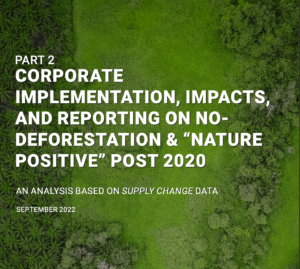Achieving Deforestation Free Corporate Supply Chains Remains a Challenge
Urgent corporate action is needed to overcome persistent barriers in fulfilling sustainability commitments across forest-risk supply chains. Both companies and investors will have a pivotal role in the next five years in driving transformational change towards eliminating commodity-driven deforestation.

September 12, 2022 – Supply Change (SC), a non-profit initiative of Forest Trends, has published a two-part series explores corporate progress on their sustainability commitments and supply chain management since 2020. The latest publication, Corporate Implementation, Impacts, and Reporting on No-Deforestation & “Nature Positive” Post 2020, offers a comprehensive evaluation of 125 leading consumer brands and retailers’ efforts to end commodity driven deforestation in the production or supply of forest-risk commodities including cattle, cocoa, palm oil, soy, timber, paper and pulp.
About Supply Change: Forest Trends’ Supply Change Initiative draws from publicly available data to track a global set of companies, representing all levels of the supply chain from producers to retailers, and their commitments to address commodity-driven deforestation. SC compiles all research in a sophisticated database management system of over 900 companies that enables the generation of insights within cattle, cocoa, palm oil, soy, timber, paper and pulp supply chains.
Over the next five years (2022–2027), SC will publish corporate and investor-tailored reports annually, summarizing key trends in the commitments, implementation and impacts of companies’ sustainable commodity commitments. They will identify trends in corporate sustainability commitments within key forest-risk supply chains that are emerging post-2020 and in addition to providing this “state of corporate deforestation commitments”, they will offer actionable information to enhance sustainable practices in corporate portfolios and mitigate potential reputational, operational, and market risks.
Part one focused on corporate commitments and policies. In Part 1, Corporate Progress on No Deforestation and “Nature Positive” Post 2020, SC found that most companies had time-bound commitments to reduce forest loss, but many did not have sufficient systems to implement their commitments, including comprehensive risk assessment processes and greenhouse gas (GHG) emissions measurement and mitigation strategies that included Scope 3 emissions.
Despite maintaining a commitment for at least one forest-risk commodity, many commitments did not cover companies’ entire supply chains, and SC noted recurring issues with commodity coverage and the level of detail provided by companies. Overall, SC found that companies are working to understand and minimize the impacts of their commodity production and sourcing, but many are still falling short on key facets of sustainability reporting.
Part two focuses on implementation, impacts and progress towards achieving commitments. In the second part of this two-part series, Corporate Implementation, Impacts, and Reporting on No-Deforestation & “Nature Positive” Post 2020, SC builds on its previous findings to assess trends in the approaches used by companies to implement and disclose progress on their commitments. Trends discussed include companies’ approaches to monitoring, traceability, risk management, supplier engagement, progress reporting, and GHG emissions reporting. This report also highlights the implications of these trends and where there are opportunities for investors to encourage companies in their portfolios to adopt best practices for effective implementation and reporting.
Above all, this reporting demonstrates that urgent action is needed to overcome persistent barriers to drive progress in fulfilling corporate sustainability commitments in forest-risk supply chains. Both companies and investors will have a pivotal role in the next five years in driving transformational change towards eliminating commodity-driven deforestation, reducing greenhouse gas emissions, and protecting human rights throughout their supply chains.
For more information, please contact info@supplychange.org
Please see our Reprint Guidelines for details on republishing our articles.

